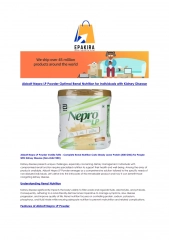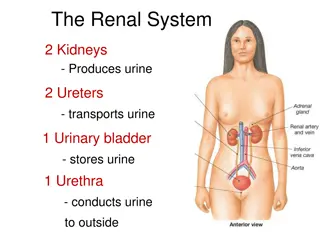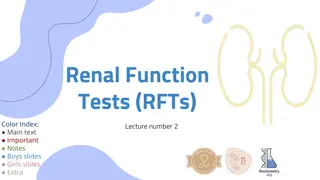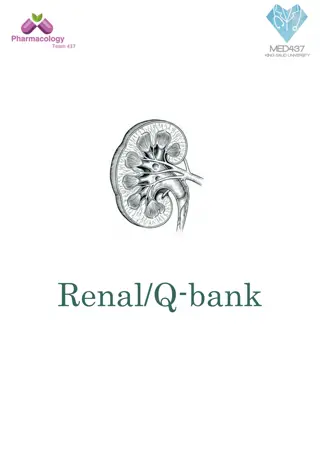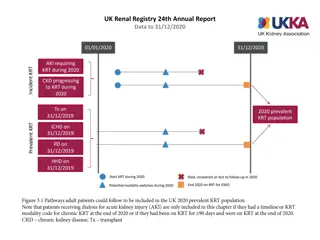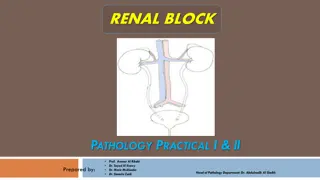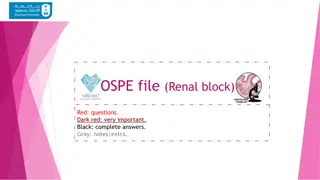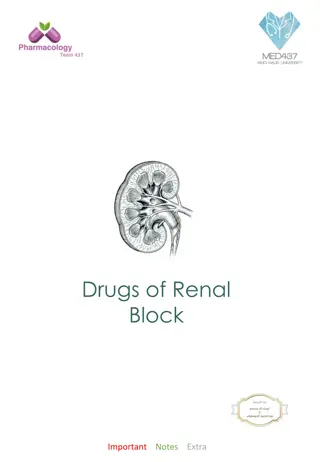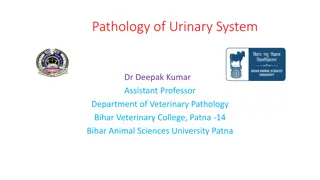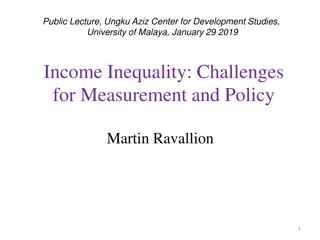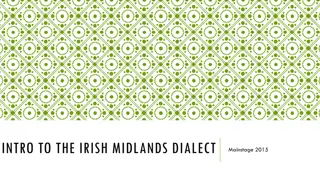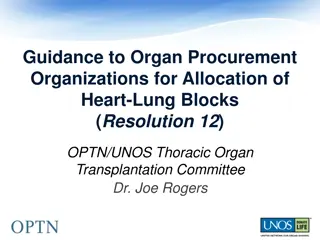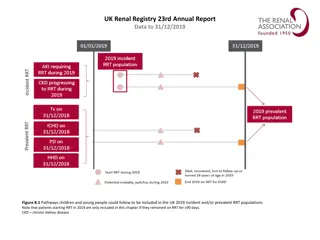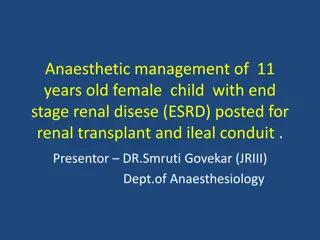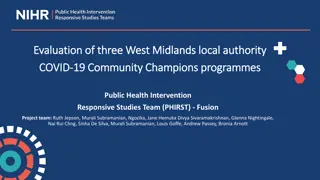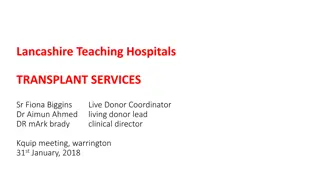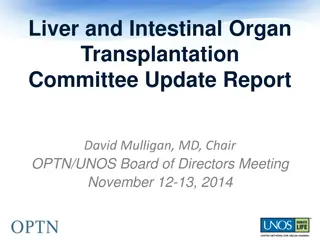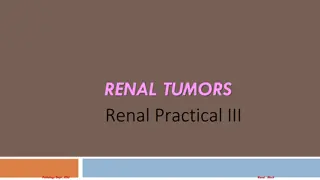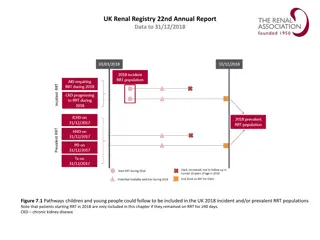Addressing Inequality in Renal Transplantation Access Across West Midlands
This project, initiated by the West Midlands Cardiovascular Strategic Clinical Network, aims to reduce waiting times for renal transplantation and improve access for all patients in the region without disadvantaging current dialysis or transplant-listed individuals. Through collaborative efforts and early progress updates, the project is dedicated to enhancing the process for patients like Brendan who strongly desire a kidney transplant.
Download Presentation

Please find below an Image/Link to download the presentation.
The content on the website is provided AS IS for your information and personal use only. It may not be sold, licensed, or shared on other websites without obtaining consent from the author.If you encounter any issues during the download, it is possible that the publisher has removed the file from their server.
You are allowed to download the files provided on this website for personal or commercial use, subject to the condition that they are used lawfully. All files are the property of their respective owners.
The content on the website is provided AS IS for your information and personal use only. It may not be sold, licensed, or shared on other websites without obtaining consent from the author.
E N D
Presentation Transcript
+ Transplant first: Addressing inequality of access to renal transplantation across the West Midlands Kerry Tomlinson on behalf of sponsor group UK Kidney Week 2016
Background: identifying the problem Transplant list ESRD Transplant UK RR 2014 report median time to listing 488, 598, 641, (683), 712, 765, 787, 867
+ Pre-emptive transplant rates are lower than average Source: Annual Report Kidney Transplantation 2014/15, NHS Blood and Transplant Source: Annual Report on Kidney Transplantation 2014/15, NHS Blood and Transplant
+Brendans Voice "When my kidneys failed, getting a kidney transplant became the most important thing that I had ever wanted in my life. I have never wanted anything more and never will. Each step of the way I was accompanied by a desperate longing for it to happen, and every setback and delay was something I felt acutely, and caused a lot of anxiety"
+Project Background Proposed to and adopted by West Midlands Cardiovascular Strategic Clinical Network (Renal Expert Advisory Subgroup) Aims to:- lead to a progressive reduction in the excessive waiting times to renal transplantation in the West Midlands Improve access to renal transplantation for all patients in the west midlands The project will not disadvantage existing dialysis or transplant listed patients Full mandate and documents on website www.wmscnsenate.nhs.uk
+ Project Launch Event July 2015 Patients and carers Renal Units SCN Project and Mandate approved Transplant Units External experts Shared Data, Successes and Challenges
+Early progress All units signed up and identified project leads CEOs were written to and committed to project Agreement reached to openly share data Patients recruited for workstreams PID, project structure, and project plan agreed Bimonthly team conference calls Project management (communication, gentle encouragement, organization, central driving force without which there would be no project) Sponsor team realised how enormous project was
+Project Structure Data, measures and implementation (K erry Tomlinson ) Identify data required, its source and obtain agreement to share data across the region Agree formatting and regularityof reporting, e.g. quarterly audit and feedbackof total transplant, live donor, deceased donor and pre-emptive transplant listing rates at each unit Identify repository for data Develop infrastructure for audit, review and reporting, e.g. RCA and audit of all patients starting RRT without a transplant list status KQUIP Partnership Board Standards and guideline (N ick Inston ) Sponsor Team Identify clinical standards and guidelines needed to improve access to transplant e.g. written acceptance criteria for acceptance on kidney transplant waiting list Identify where documents already available and identify gaps, developing regional standards and guidelines as required UKRR Pathways ( Kerry Tomlinson) Map the current patient pathways by renal unit across the region Co-design exemplar pathways with patients and clinicians in line with agreed standards and guidelines Patient information (Helen Spooner) Collate information used across the region and upload to SCN website Identify any gaps and develop further resources as required ODT Education (Cecily Hollingworth) Identify training needs of all project participants,e.g. QI for unit leads and patient representatives Source/design, cost and deliver training Establish action learning sets Design first transplant education and audit event to share best practice, for roll-out annually thereafter Taking organ transplantation to 2020 LDKT 2020 NICE
+Data: What will we achieve? (What will success look like) 95% of all CKD 5 patients will have a documented transplant decision West Midlands will achieve >95% patients starting RRT with a transplant status > 50% of patients will be listed pre-emptively The West Midlands will have the highest rate of pre- emptive listing in the UK The wait for deceased donor kidneys in the West Midlands will be in line with the national average or better We will be in the top 50% of transplant units for pre- emptive transplants
+Open sharing: NHSE quality dashboard: access to transplant Old Data
+Early data Commonest cause of missing transplant listing is late referral Some immediate policy differences spotted (e.g. when to do cardiac catheter) Units can spot patterns in causes e.g. from feeder hospitals/clinics Needs some more refining Units collecting data for annual audit event in July 16 including current pre-emptive rates
+Standards and guidelines Discussion re BMI cut off Defined when to workup Did not change referral threshold
+Patient information Patient information Collated Working with patients to review current information and identify gaps Aim to produce core information resources In conjunction with the RR, Donor View , an online programme to support live donors through the donation process, is in development Donor Patient View
+Education Encouraged enrolment in Massive Open Online Course (MOOC): Improvement FUNdamentals http://www.nhsiq.nhs.uk/capacity-capability/improvement- fundamentals.aspx Absorbed and delivered in other workstreams People much happier with doing rather than being taught You need QI methodology but not everyone needs to know it
+Pathways 2 all day Pathway redesign events Some QI training included 5 CPD points from RCP and RCN reflective learning tool included Opportunity to hear patient voice Target audience from each unit CKD consultant and nurse Transplant consultant and nurse Directorate manger Data Lead Patient representative Open to trainees Units worked on own pathways Work on hand off between units Pathways very varied and need to be designed and delivered locally with support
+Challenges Tension Between facilitators/participants Between units & opinions Between project leaders and their own units Between project teams and their other roles People (Consultants) Resources To complete project To work in different way Designated staff roles More clinic time Post its
+Positives Permission to spend time together (people were very cross if they perceived this was wasted) Quick Wins Mobile numbers on referral letters Transplant unit to tell referring units about appointments Agreement Finish tests before referral Start Donor workup sooner Single point of referral Work towards limited or lead consultants
+ How have units found it: negatives Lack of time for individual units to discuss changes Software barriers still unable to report all CKD5 patients on renal IT system Whole process was slower or delayed due to Consultant shortage Consultants not documenting Staffing shortages with nurses as well as Consultants to improve transplant issues, this includes link nurses time as well
+How have units found it: positives Better collaborative working to improve patient experience Transplant status being recorded on all patients, which will make auditing easier We now have a Transplant Co-ordinator in post Increased communication Working with other units to improve transplantation and work together for a better patient experience 6 project arms covering work-up all the way through process to listing Highlighted pathway delays and led to re-design Identified timescales and how different members of staff contributed to the pathway Pathways changes already evident Better data to influence decisions Improving transplant profile for staff and patients
+Can we do it? We increased Home Dialysis rates Target driven Clinical Champions Good systems Finance
+Acknowledgements West Midlands Clinical Network Sponsor team Dr Kerry Tomlinson, Project Co-Lead for Transplant First, Consultant Nephrologist, UHNM Cecily Hollingworth, Quality Improvement Officer, West Midlands Clinical Network Helen Spooner, Project Co-Lead & Advanced Nurse Practitioner, Royal Wolverhampton NHST Dr Clara Day, Renal Clinical Director, West Midlands Clinical Network Mr Nick Inston, Renal Surgery Consultant, UHBFT Dr Nithya Krishnan, Consultant Transplant Nephrologist, UHCW Ron Cullen, Chief Executive, UK Renal Registry Dr David Dimeloe, Donor Representative Partnership Board Rob Wilson, Interim Associate Director for SCN and CVD Network Manager (Chair) Lisa Burnapp, Lead Nurse, Living Donation, NHS Blood & Transplant Mark Davis, Patient Representative & West Midlands Advocacy Officer for NKF Sarah Freeman, Specialised Commissioner, NHS England Dr Graham Lipkin, Kidney Quality Improvement Programme (KQUIP) Thank you to all patients, carers and kidney unit staff members who are working on the project


